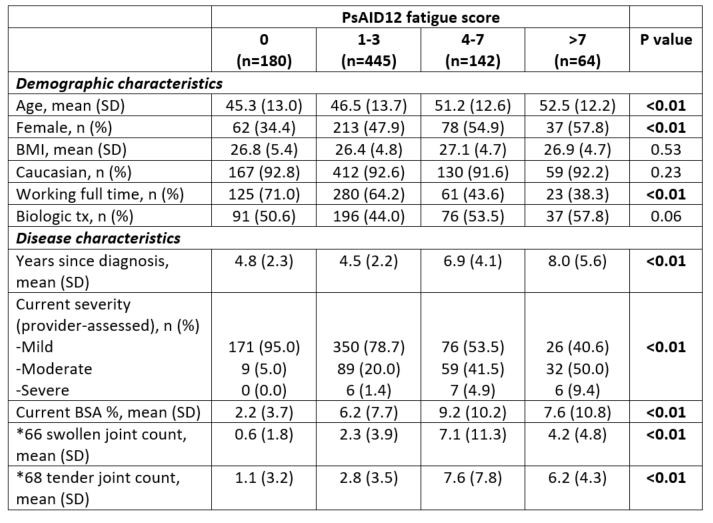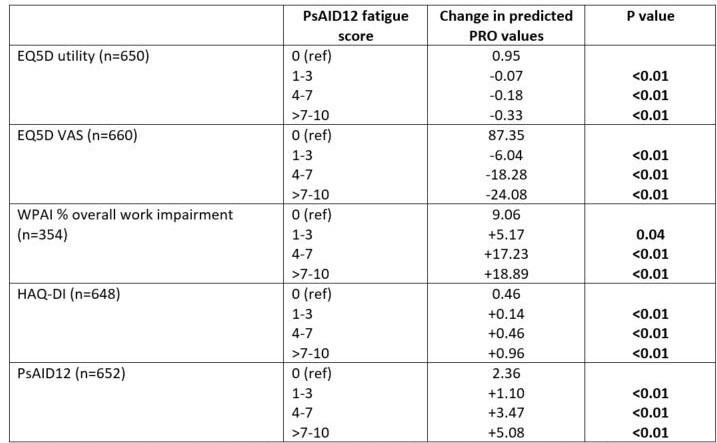Session Information
Date: Sunday, November 8, 2020
Session Type: Poster Session C
Session Time: 9:00AM-11:00AM
Background/Purpose: Fatigue is an important aspect of PsA for patients. Understanding the impact of fatigue on patient reported outcomes is important for effective management of PsA. The objective of this study was to compare clinical and patient-reported outcomes in patients who report fatigue and those who do not, and to describe the prevalence of fatigue in PsA patients from physician and patient perspective.
Methods: Cross-sectional study among patients with PsA recruited by rheumatologists and dermatologists in France, Germany, Italy, Spain, UK, and US. Data were collected from Jun-Aug 2018 via physician-completed patient record forms and patient self-completed forms. Physicians reported patient demographic and disease characteristics, and if patients experienced fatigue (yes/no). Patients also reported fatigue via PsAID12 domain scale (0-10 score, grouped for analysis as 0, 1-3, 4-7, >7), quality of life (EQ5D-5L), work productivity (WPAI), and disability (HAQ-DI). Patients were compared according to grouped fatigue scores using parametric tests and non-parametric tests. Multiple linear regression analyses examined impact of incremental PsAID12 fatigue score on patient reported outcomes (PROs) (EQ5D, HAQ-DI, PsAID12, WPAI). Models controlled for gender, age, BMI, body surface area psoriasis percent, number of joints affected, pain, and Charlson Comorbidity Index score. Regressions were run on patients for whom all variables were available.
Results: Data were collected from 932 physician-patient pairs. Regression analyses showed that patients with increasingly severe fatigue scores reported worse outcomes in terms of quality of life, work impairment, and disability than those with lower fatigue scores. Physicians reported fatigue in 27.5% of patients, while 80.7% of patients reported they experienced fatigue. 44.9% of physician-patient pairs agreed on fatigue presence or absence.
Conclusion: After adjusting for demographic and clinical factors, patients with severe fatigue were found to have worse clinical, quality of life, work productivity, and disability outcomes than those with mild or no fatigue. Differences between patient and physician reports of fatigue suggest that physicians may not be aware of the extent to which patients experience fatigue.
 Table 1: Demographic and clinical characteristics by patient reported PsAID12 fatigue score.
Table 1: Demographic and clinical characteristics by patient reported PsAID12 fatigue score.
 Table 2: Incremental impact of PsAID12 fatigue score on PROs. α PRO key for worse outcome (range): EQ5D utility (0-1.0) = lower; EQ5D VAS (1-100) = lower; WPAI (0-100) = higher; HAQ-DI (0-3) = higher; PsAID12 (0-10) = higher.
Table 2: Incremental impact of PsAID12 fatigue score on PROs. α PRO key for worse outcome (range): EQ5D utility (0-1.0) = lower; EQ5D VAS (1-100) = lower; WPAI (0-100) = higher; HAQ-DI (0-3) = higher; PsAID12 (0-10) = higher.
To cite this abstract in AMA style:
Walsh J, Michaud K, Holdsworth E, Peterson S, Booth N, Meakin S, Chakravarty S, Piercy J, Ogdie A. Fatigue in Psoriatic Arthritis (PsA): Prevalence in Patients from the US and Europe, and Impact on Quality of Life and Work Productivity [abstract]. Arthritis Rheumatol. 2020; 72 (suppl 10). https://acrabstracts.org/abstract/fatigue-in-psoriatic-arthritis-psa-prevalence-in-patients-from-the-us-and-europe-and-impact-on-quality-of-life-and-work-productivity/. Accessed .« Back to ACR Convergence 2020
ACR Meeting Abstracts - https://acrabstracts.org/abstract/fatigue-in-psoriatic-arthritis-psa-prevalence-in-patients-from-the-us-and-europe-and-impact-on-quality-of-life-and-work-productivity/
